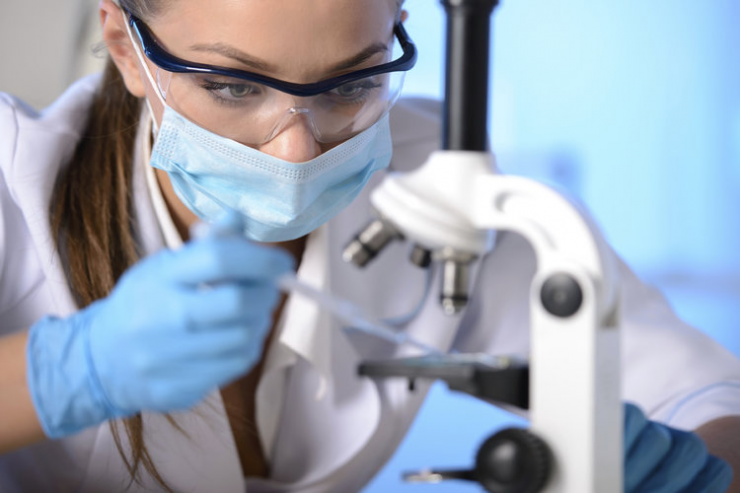Microbix Biosystems (TSX:MBX) is validating a new bioreactor manufacturing platform for its world-leading line of viral and bacterial antigens and other virology products ahead of a full roll-out to customers towards the end of 2016.
“Once the new platform is fully implemented, it will reduce our manufacturing costs, greatly expand our available capacity and improve our carbon footprint,” president and CEO, Vaughn Embro-Pantalony, says in an interview with BioTuesdays.com.
Antigens are the key reactive components used in diagnostic tests and vaccine research. Microbix was founded in 1988 around the virology business, culturing and purifying antigens for use in research, diagnostic testing, and vaccine development.
“We’re at the tail end of the installation program, testing new hardware and making sure that the correct media is in place to maximize cell growth in order to meet purity and yield requirements,” he adds.
Mr. Embro-Pantalony explains that Microbix is working with key customers to convert some initial products to the new production process, and it will continue shipping samples to customers for testing.
As a result of the new manufacturing platform, many of Microbix’s customers will need to obtain regulatory approvals so that their diagnostic testing kits conform to the standards that were approved originally.
Microbix is validating a new bioreactor manufacturing platform that will reduce its manufacturing costs, expand its capacity and improve the company’s carbon footprint.
Mr. Embro-Pantalony emphasized the importance of investing in its virology business to maintain its global leadership position. “Investing in viral antigens is one of our strategic priorities. We will be able to produce our products more cost competitively, while also pursuing new product growth opportunities in virology, thereby expanding our market share.”
Virology products revenue has grown from approximately $4-million in 2012 to $8.2-million in the fiscal year ended September 30, 2015. “Our new vision is to go to $20-million by 2020,” he contends.
Microbix’s current virology manufacturing facility was built in 2008. The business has always been a labour-intensive process, using tens of thousands of “roller bottles” where infectious disease viruses are grown to make about half the world’s requirement of infectious disease antigens.
While the plant has been retrofitted to support steady sales growth, reaching 150% of its original design capacity, “it became necessary to implement a more comprehensive capacity solution in order to accommodate a potential doubling of demand for our virology products over the next five years,” Mr. Embro-Pantalony points out.
To enhance the company’s leadership position, Mr. Embro-Pantalony looks to growing demand in the developing world for the TORCH diagnostic panel, which is routinely administered to expectant mothers during the first trimester of pregnancy.
Microbix just launched a full range of Dengue antigens, enabling its customers to design more sensitive tests and kits to diagnose Dengue Fever and develop vaccines against the mosquito-borne tropical illness.
The TORCH screen is a group of blood tests that check for several different infections in a newborn, including toxoplasma, rubella, cytomegalovirus (CMV), herpes simplex, and HIV.
Microbix is the world’s No. 1 supplier of rubella and CMV, and added toxoplasma products to its product line last year. “Adding the toxoplasma antigen was a natural fit as most of our current customers also produce assays for the detection of the toxoplasma antibody,” he says.
Microbix also is expanding its line of infectious disease antigens. The company is a leading provider of one of the four strains of Dengue Fever antigen and has identified the other three mutations of the virus.
“Customers are requesting these products for their test kits and we have just launched the full range of Dengue antigens. Now, our customers can design more sensitive tests and kits to diagnose Dengue Fever and develop vaccines against the mosquito-borne tropical illness,” Mr. Embro-Pantalony says.
Microbix also has initiated development of products for use in diagnostic tests and vaccine research of the Zika virus, which is spreading throughout the Americas and has been linked to babies born with birth defects. Zika, chikungunya and West Nile viruses are all members of the same family as Dengue flavivirus.
Mr. Embro-Pantalony says another area of future growth for Microbix is molecular diagnostics (MDx), using genetic biomarkers for infectious disease products.
The company has a well-established line of quality control reagents, selling to customers involved in institutional accreditation testing. The controls are used to assess the performance of conventional diagnostics tests at the critical extraction, amplification and detection phases of a test.
“It’s exactly the right time to invest in the development of control products for the MDx market,” Mr. Embro-Pantalony says.
“We are global leaders in the manufacture of infectious disease antigens for traditional diagnostics products and our expansion into the MDx space gives us access to very significant and exciting new growth opportunities,” he adds.
“The MDx market is growing at four-to-five times that of the conventional diagnostics market, and it’s a natural fit with Microbix, which is uniquely positioned to serve this emerging area.”
Another area of future growth for Microbix is molecular diagnostics (M Dx), which uses genetic biomarkers for infectious disease products.







